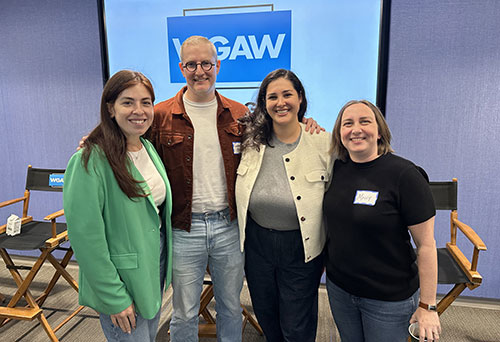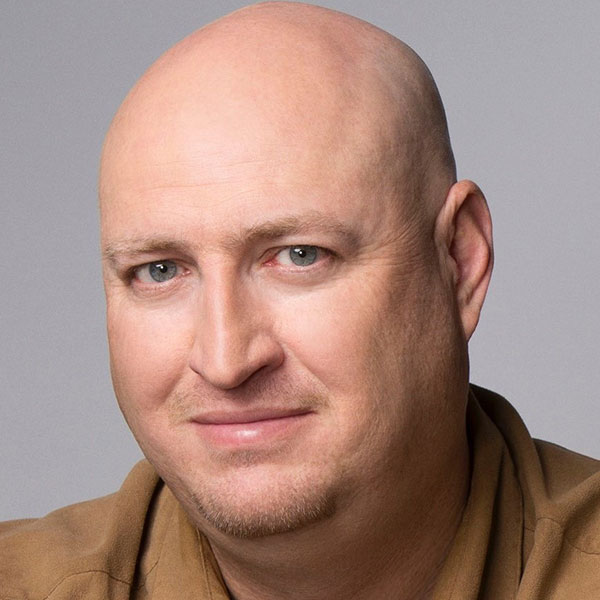How do mid-level writers chart their paths upward? Are reps essential to facilitating this climb? If so, how many, which ones, and how do you amicably part from the ones who aren’t working? What advice can showrunners offer that will help mid-level writers one day—in the words of The Night Agent creator and S.W.A.T. co-developer Shawn Ryan—“position yourself to take my job”?
These and other related topics were the focus as the Guild recently concluded its inaugural Mid-Level Training Program (MLTP). Over four sessions, more than 100 Guild members whose most recent series credit is Story Editor, Executive Story Editor, or Co-Producer discussed elements of writers’ room dynamics, prep, production, and post-production with a lineup of experienced producers, showrunners, and screenwriters.
 From left: CAA Agent Austin Denesuk, Haven Entertainment Literary Manager Garrett Greer, Daniela Gonzalez of Good Fear Content, and WGAW Board member Molly Nussbaum.
From left: CAA Agent Austin Denesuk, Haven Entertainment Literary Manager Garrett Greer, Daniela Gonzalez of Good Fear Content, and WGAW Board member Molly Nussbaum.“One of the reasons this [MLTP] program exists is that so many people say they feel like they get stuck in the middle or they hit a certain level and then feel like they don’t know how to catapult to the next one,” said WGAW Board member Molly Nussbaum, who developed the program with WGAW Vice President Travis Donnelly. “When you are at mid-level, it’s great to start thinking more about what do you want your career to look like? What kind of showrunner or boss do you want to be?”
Ryan’s Recommendations
During his keynote address, Ryan talked about his career as a writer and the types of things he looks for in the writers he employs. A great script is often a calling card, particularly if it’s one that makes the showrunner envious that they themselves had not written it. A strong script accompanied by a recommendation from one or more showrunners (“Hey this writer is really great. He’s done good work for us. You should read him.”) carries weight.
When should recommendations be sent? The earlier the better. “By the time something gets announced in Deadline, it’s usually staffed up is my experience,” Ryan said. “If you’ve got a good agent, and they’re letting you know not just what’s been picked up but what looks like it’s going to get picked up and can you get recommendations, that would be the most valuable in my mind.”
Ryan recommended that writers have their samples up-to-date, and that they should have more than one to show versatility. If they get a meeting, they should familiarize themselves with the show they’re interviewing for. When he interviewed for Nash Bridges in the 1990s, Ryan learned which episodes of the series had been among the showrunners’ favorites.
 The Night Agent creator and S.W.A.T. co-developer Shawn Ryan.
The Night Agent creator and S.W.A.T. co-developer Shawn Ryan.“Find what you think you can contribute to the show, and find what you can be passionate about,” Ryan said. “In that meeting, you’ve got 30 to 60 minutes to prove that it would be good to be around you for 8, 10, 12 hours a day.”
As a showrunner, Ryan emphasized that he is looking for writers who find ways to make his life easier, whether it’s because they bring a skill or an area of expertise that the writers’ room doesn’t currently have, because they turn in drafts that don’t need extensive polishing or because they solve production problems before they rise to the showrunner level.
He counseled mid-level writers to carefully observe their bosses with an eye toward identifying what they would like to emulate and what they would choose to do differently.
Asked about things he wished he had done differently while still a mid-level writer, Ryan said he should have taken an extra pass at every script he turned in. Even knowing that the work would be rewritten, Ryan believed that extra attention would have been beneficial.
“Going back, I would have said, ‘Let me write this as if I’m the showrunner,’” he said. “I knew there were some scenes that kind of worked but maybe didn’t completely work. Rather than just saying, ‘Well, the higher-ups will fix that,’ let me try harder to fix it myself. That was one mistake: I was a little too eager to get it off my plate, and onto someone else’s plate.”
The event also included a discussion from a group of agents and managers for a panel titled “Moving on Up.” Panelists included CAA Agent Austin Denesuk, Haven Entertainment Literary Manager Garrett Greer, Good Fear Content Literary Manager Daniela Gonzalez, and WGAW Agency Department Director Leila Azari.

Find what you think you can contribute to the show, and find what you can be passionate about.
- Shawn Ryan
Rep-Client Relationships
Besides the work they’re helping you get, what are some of the elements that makes for a solid professional relationship between a writer and his representative? Emphasizing that the partnership is a business and a personal relationship, the panelists said that writers should never be afraid to have challenging conversations around the topic of money.
From a literary manager’s perspective, Greer characterized his role with his clients as “a one-man writers’ room and a therapist (unlicensed)” as well as a person who is helping his clients manage their relationships with their agents.
 WGAW Board member Molly Nussbaum.
WGAW Board member Molly Nussbaum. “I know from my agent friends they don’t want 1,000 emails. I’ll take 1,000 emails,” Greer said. “I don’t want them, but I’ll take them. So it’s like ‘How can we make sure that we’re communicating with your agent as effectively as possible to get the things you want from them so they’re activated in the right way?’”
Steps Toward Career Advancement
What can writers do to help themselves be marketable both to reps and to the showrunners whose attention they are trying to attract? Generating new material is often a good attention-getter, particularly if it’s a script from a recent staff job.
Gonzalez said that coming in with a script that is different from the material you typically write can also be advantageous.
“Your resume may give someone the perception of the kind of writer that you are, so if you have a piece of material that deviates from that purposefully, work with your representative. Put them to work,” Gonzalez said.
Greer stressed the value of getting production experience, and of taking the opportunity to get additional information and skills—potentially by shadowing someone in post-production or sitting in on meetings.
“You might have to carve out some space for yourself that way,” Greer said. “The answer might not always be yes, but I think that can be really helpful especially when we’re in a time where there are less of those opportunities.”
Breaking Up With a Rep
Acknowledging that the situation is never comfortable, the panelists offered suggestions for how to proceed when a professional relationship isn’t working and a change needs to happen.
Among their advice: get your story straight regarding the reasons you’re not satisfied with a rep, since the conversation might turn into a discussion. If possible, give the reps the opportunity to make improvements before terminating the relationship, and let other members of your team know that you‘re planning on firing a rep so people are not caught off guard.
“You’ll feel better afterwards,” Gonzalez said. “Chase that feeling of relief as you’re going into the call.”
No Rep? The Agency Department Can Help
Although the department does not negotiate deals for members, the WGAW Agency Department offers several services that can help members set up their deals, regardless of whether they have representation.
These include providing information about recent deals that other writers have struck with a given studio. As a result of the Guild’s 2020 Agency campaign, agencies share information with the Guild about writers’ employment as required by the Agency Franchise Agreement. So writers can learn whether a given studio has given a multi-step deal, or get specific information about pilot script fees, EP and/or weekly fees and lots of other information from an ever-expanding database of more than 43,000 deals. Nussbaum and Azari also highlighted the Guild’s efforts to collect late pay that has helped writers get money that they are owed with interest.
Nussbaum recounted a recent instance of using the Late Pay Desk and its successful outcome.
“I was paid late on first three steps of project I was still working on,” she said. “I sent them the day I was commenced, the date I was delivered, and a very nice check came in the mail. It didn’t involve anyone, none of the execs know about it. That’s money we are entitled to, so take advantage of it.”






